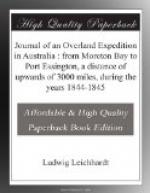We followed a broad foot-path of the natives, which cut the angles of the river, and passed along several large lagoons at the foot of some low sandstone ridges, that occasionally approached the river, which was joined by some brushy creeks, one of which was of a considerable size. The box-trees were of stunted growth, but the raspberry-jam trees were still abundant and larger than usual. The grass was plentiful, but old and dry. The lagoons were covered with ducks, geese, and pelicans; and native companions were strutting about on the patches of fresh burnt grass. Brown pursued two emus, and caught one of them. Wallabies were numerous; two bustards, and even a crocodile were seen. A small lizard or newt was observed on the mud between high and low water marks. The green ant of the Lynd inhabited the shady trees of the brushy banks; and, in the forest, brick coloured and black ants were numerous and troublesome.
A strong easterly wind was blowing during the day, and no cumuli formed.
Camps of the natives were frequent, and fresh burnings and fresh mussel-shells showed that they had been lately at the lagoons. But, on the river, the camps were older and not so numerous, and no burnings had lately taken place.
Oct. 21.—After waiting a very long time for our horses, Charley came and brought the dismal tidings that three of the most vigorous of them were drowned, at the junction of the creek with the river. Although the banks of the Roper were steep and muddy, the large creek we had passed was scarcely two miles distant, and offered an easy approach to the water on a rocky bed. It remained, therefore, inexplicable to us how the accident could have happened.
This disastrous event staggered me, and for a moment I turned almost giddy; but there was no help. Unable to increase the load of my bullocks, I was obliged to leave that part of my botanical collection which had been carried by one of the horses. The fruit of many a day’s work was consigned to the fire; and tears were in my eyes when I saw one of the most interesting results of my expedition vanish into smoke. Mr. Gilbert’s small collection of plants, which I had carefully retained hitherto, shared the same fate. But they were of less value, as they were mostly in a bad state of preservation, from being too much crowded. My collection had the great advantage of being almost complete in blossoms, fruit, and seed, which I was enabled to ensure in consequence of the long duration of our expedition, and of the comparative uniformity of the Australian Flora.
I left the unfortunate place, and travelled about six miles up the river, which kept a W. N. W. course. Open box-flats were bounded by ridges two or three miles from the river. At the opposite side, ranges were seen with some rocky bluff hills. Charley shot a bustard.




